人教版八年级下学期英语语法讲解
英语八下人教版重点语法

英语八下人教版重点语法
英语八下人教版的重点语法包括:
1.过去完成时(Past Perfect Tense):用来表示在过去某个时间或动作之前已经发生或完成的动作。
例如:I had already
finished my homework before my mom came back.
2.时间状语从句(Time clauses):用来表示时间关系的从句,一般以when,as soon as,until,before,after等引导。
例如:We will go to the park when it stops raining.
3.条件状语从句(Conditional clauses):用来表示假设条件的从句,一般以if引导。
例如:If it rains tomorrow, we will stay at home.
4.动词不定式(Infinitives):用来表示目的、原因、建议等。
例如:I went to the store to buy some groceries.
5.被动语态(Passive voice):用来强调动作的承受者而不是执行者。
例如:The cake was made by my mom.
6.定语从句(Relative clauses):用来修饰名词或代词的从句,一般由关系代词who,which,that引导。
例如:The boy who won
the competition is my neighbor.
这些语法结构在英语八下人教版教材中经常出现,需要学生掌握
和应用。
希望以上回答能对您有帮助。
人教版英语八年级下册Unit 1-5 单元语法知识梳理
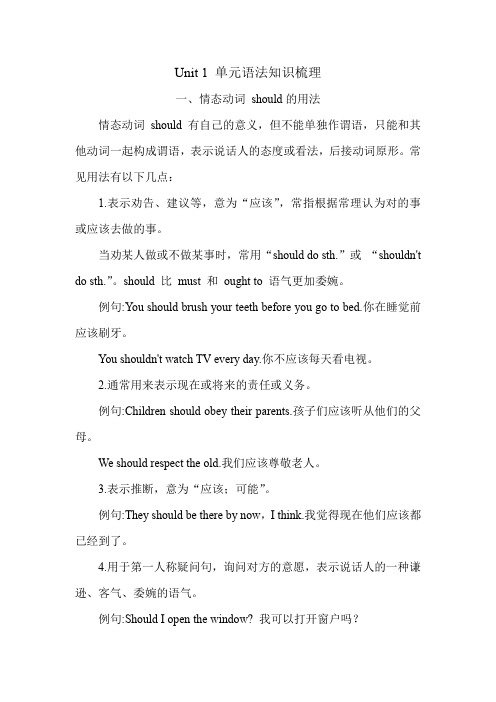
Unit 1 单元语法知识梳理一、情态动词should的用法情态动词should有自己的意义,但不能单独作谓语,只能和其他动词一起构成谓语,表示说话人的态度或看法,后接动词原形。
常见用法有以下几点:1.表示劝告、建议等,意为“应该”,常指根据常理认为对的事或应该去做的事。
当劝某人做或不做某事时,常用“should do sth.”或“shouldn't do sth.”。
should 比must 和ought to 语气更加委婉。
例句:You should brush your teeth before you go to bed.你在睡觉前应该刷牙。
You shouldn't watch TV every day.你不应该每天看电视。
2.通常用来表示现在或将来的责任或义务。
例句:Children should obey their parents.孩子们应该听从他们的父母。
We should respect the old.我们应该尊敬老人。
3.表示推断,意为“应该;可能”。
例句:They should be there by now,I think.我觉得现在他们应该都已经到了。
4.用于第一人称疑问句,询问对方的意愿,表示说话人的一种谦逊、客气、委婉的语气。
例句:Should I open the window? 我可以打开窗户吗?What should we do now? 我们现在该干什么呢?5.表示某种感情色彩,意为“竟会”,常用于以how, why开头引导的特殊疑问句中。
例句:Why should you be so early today? 你今天为什么会如此早?二、反身代词1.反身代词的构成反身代词是一种表示反射或强调的代词。
它由第一人称、第二人称的形容词性物主代词和第三人称代词的宾格加词尾-self或-selves构成。
其构成如下表:反身代词与它所指代的名词或代词形成互指关系,两者在人称和数上应保持一致。
(完整版)人教版八年级下册英语语法解析总结,推荐文档
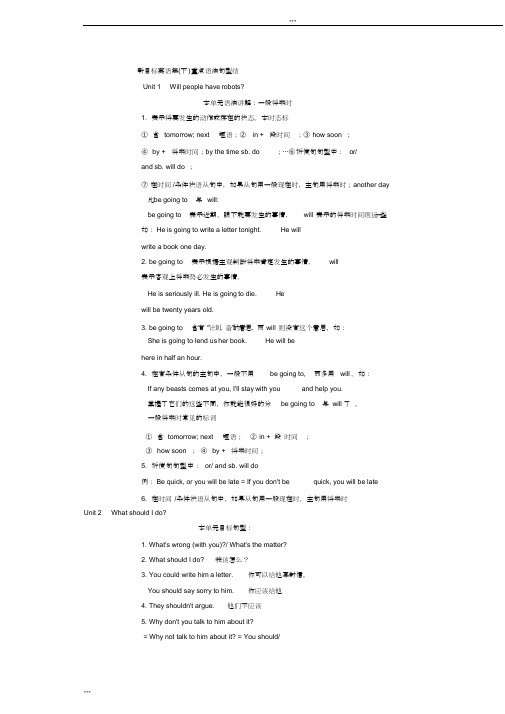
新目标英语年(下)重点语法句型结Unit 1 Will people have robots?本单元语法讲解:一般将来时1. 表示将要发生的动作或存在的状态。
本时态标①含tomorrow; next 短语;②in + 段时间;③how soon ;④by + 将来时间;by the time sb. do ;⋯⑥祈使句句型中:or/and sb. will do ;⑦在时间/条件状语从句中,如果从句用一般现在时,主句用将来时;another day比be going to 与will:be going to 表示近期、眼下就要发生的事情,will 表示的将来时间则远一些。
如:He is going to write a letter tonight. He willwrite a book one day.2. be going to 表示根据主观判断将来肯定发生的事情,will表示客观上将来势必发生的事情。
He is seriously ill. He is going to die. Hewill be twenty years old.3. be going to 含有“计划,备”的意思,而will 则没有这个意思,如:She is going to lend us her book. He will behere in half an hour.4. 在有条件从句的主句中,一般不用be going to, 而多用will 。
如:If any beasts comes at you, I'll stay with you and help you.掌握了它们的这些不同,你就能很好的分be going to 与will 了。
一般将来时常见的标词①含tomorrow; next 短语;②in + 段时间;③how soon ;④by + 将来时间;5. 祈使句句型中:or/ and sb. will do例:Be quick, or you will be late = If you don't be quick, you will be late6. 在时间/条件状语从句中,如果从句用一般现在时,主句用将来时Unit 2 What should I do?本单元目标句型:1. What's wrong (with you)?/ What's the matter?2. What should I do? 我该怎么?3. You could write him a letter. 你可以给他写封信。
初中英语人教版八年级下册重点语法详解( Unit 1-6)

八年级英语下册重点语法详解Unit 1Irene Irene中英文天地 2023-03-16 12:19 发表于广东1.have / get / catch a(n)+疾病名称,表示患某种疾病。
e.g.I have / get / catch a cold.我感冒了。
【拓展】have a bad cold 重感冒have a fever 发烧have a headache 头痛have a stomachache 肚子痛, 胃痛have a toothache 牙痛have a backache 背痛2.lie down 躺下e.g.You had better lie down and have a rest.你最好躺下休息。
3.have a rest = take a rest = rest 休息have a break=have breaks=take a break=take breaks (课间)休息4.away from 离开……;与……有一定的距离(与不同动词搭配,意思会受上下文影响)e.g.They live away from us.他们住的地方离我们远。
5.see sb.doing sth.看见某人正在做某事e.g.When I pass the window I see him drawing a picture.当我经过窗户时,看到他正在画画。
see sb.do sth.看见某人做过某事e.g.I often see him draw pictures.我经常看到他在画画。
6.think twice 认真思考,权衡利弊e.g.We must think twice before we make this decision.我们在做决定之前应该权衡利弊。
7.to one’s surprise 使……惊讶的是,出乎……意料e.g.To their surprise, all the students pass the exam.令他们惊讶的是,所有学生都通过考试了。
人教版八年级英语下册重要语法知识点汇总

人教版八年级英语下册重要语法知识点汇总人教版八年级英语下册重要语法知识点汇总1. 否定句型1) 一般否定句I dnt knw this. N news is gd news.There is n persn (ske)/nt a persn/nt any persn (ske) in the huse.2)特指否定He went t his ffie, nt t see hi.I a srry fr nt ing n tie.I dnt think/believe/suppse/feel/iagine yu are right.3)部分否定All the answers are nt right//All is nt gld that glittersI dnt knw all f the.//I ant see everybdy/everything.Bth f the are nt right.4)全体否定Nne f y friends ske.//I an see nthing/nbdy.Neither f the is right.//Nthing an be s siple asthis.5) 延续否定yu didnt see hi, neither/nr did I.yu dnt knw, I dnt knw either.He desnt knw English, let alne/t say nthing f/nt t speak f (更不用说) Frenh.6) 半否定句e seld/hardly/sarely/barely hear suh fine singing.I knw little English. I saw few peple.7) 双重否定yu ant ake sething ut f nthing.//hats dne annt be undne.There is n sweet withut sweat.//N gain withut pains.I ant help /keep/ laughing whenever I hear it.N an is s ld but (that) he an learn.8)排除否定Everyne is ready exept yu.//He did nthing but play.But fr yur help, I uldnt d it.9)加强否定I wnt d it at all.//I ant see it any re.//He is n lnger a by.2. 判断句型1) 一般判断句It is iprtant fr us t learn English.It is kind f yu t help e sinere eans hnest.The by is alled/naed T.e regarded/nsider it as an hnr.2)强调判断It is English that we shuld learn.//It is he wh helped e a lt.3)弱式判断yur sentene desnt sund/lk/appear/feel right.yu lk/see as if/as thught yu had been there befre.aybe/Perhaps/ she is ill.He is prbably ill.//He is likely ill. //It is pssible that he is late4) 注释判断He an reeber s any English wrds, that is (t say) he is a living ditinary.(活字典)5) 正反判断That sunds all right, but in fat it is nt.6) 比较判断It is re a piture than a pe.7) 互斥判断He r yu are wrng. Either he is right r I a.3. 祝愿祁使句式1) 一般句式Study hard and keep fit. Be brave! Dnt be shy! Get ut f here.2)强语式D tell e. Never tell a lie.3) 委婉祈使句Please tell e the true. uld/ill/nt d e a favr?uld/D yu ind y sking? hat/Hw/ abut ging n ft?4)建议祈使句Let us g. Let us knw the tie. Dnt let the fire ut.Lets nt waste the tie. yud better start early.Shall we listen t se usi? hy dnt yu get sething t drink?Suppse/suppsing yu pik e up at abut six?I suggest we (shuld) take the train.5)祝愿句Suess t yu! //ish yu a gd urney.ay yu have a happy arriage. //Heres t yur suess!Allw e t prpse a tast t ur friendship!4. 感叹句型Hw well he speaks! //Hw kind she is! //hat a nie weather it is!Here he es! //Suh is life! //nderful! // Help!5. 疑问句型1) 一般疑问句Is he a dtr?//D yu the way t the statin?2)反意疑问句He is a teaher, isnt he?//It is quite heap, dnt yu think?3) 特殊疑问句hat is the distane/width/size/ppulatin/teperature/fare?h is he? hat is he?(干什么的)//hat is he like? // Hw is he?Hw d yu like hi? //hat d yu think f hi?hat ever d yu ean by saying this?4)选择疑问句He is a dtr r a nurse?5)间接疑问句D yu knw hw ld he is? //Tell e if (whether) yu like it.hat d yu think/say/suppse I shuld d?6. 数词句型1) 表数目It is exatly ten lk.//It is five iles away fr here.He is re than/ver/ at least nt less than 20.He is under/at st/n re than 20.2)表年月日He was brn n April 22 1994/in 1994 n the rning f t.1.3)表年龄He is 20 years ld/years f age.//He is at the agef 10.4)表倍数It is fur ties that f last years.This is fur ties as big (again) as that ne.This is fur ties bigger than that ne.The ine is duble what it was.The utput f al was 200% greater than in 1998.5)表计量It is 10 eters lng/wide/high.//It sts e 100 yuan.I spent 10 hurs t finish it.//It tk e 10 days t finish it.It is wrth 100 yuan.7. 关联指代句型1)两项关连I have tw bks, ne is hinese; the ther English.I have five bks, ne is hinese; the thers English.T say is ne thing, but/and/ t d is anther.ne the ne hand, I a yur teaher, and n the ther hand, I a als yu friend.Se like t play ftball, thers are fnd f basketball.2)先后顺序First/firstly, I wish gd health, send/sendly suess in yur study, third/thirdly gd luk in everything.First stp, then lk, finally rss.At first/in the beginning/ he wrd hard. Later/Afterwards he is nt s diligent.3)修饰限制This is the sae bk as I lst yesterday.This is the sae bk that I lst yesterday.(同一本书)Dnt trust suh a an as ver praise yu.He/ne/Thse/They wh shuld e failed t appear.A an/A persn/The ne/Anyne/Peple wh saw her liked her very uh.The day/tie/ent will e when hina is strngest in the wrld.4) 两项连接He an speak nt nly English but als Frenh.The bk is bth interesting and instrutive.It is neither ld nr ht.Please either e in r g ut.The ld wrker has experiene and knwledge as well.5)加和关系Besides literature, we have graar and writing.Apart fr xygen, there are se ther gases in the air.In additin t "if", there is any ther nuntins that an intrdue nditinal lauses.I ust g nw, inidentally, if yu want that bk.yu see t like tea, s d I.8. 比较句型1)等比句He is as tall as I. // He is the sae height as I.She is n less diligent than he. The lab is n better than a ttage.2) 差比句I speak English wrse than he des.//He is nt s/astall as I a.ur knwledge is uh inferir t their.3) 极比句He is the tallest f all in the lass.Nne/N ne/ is s blind as thse that wnt see.Nthing is s easy as this.4)比例句The re a an knws, the re he feels his ignrane(无知).5) 择比句He is taller than any ther by in the lassIt is better late than never.//They wuld die than live as slavesHe prefers ding t talking//He prefers t d rather than t talk.He prefers atheatis t English.//Id rather stay here.6)对比句yu think e idle, but n the ntrary, I a busy.They are wrking hard while yu are wasting yur tie.9. 比喻句型e ust wrk like hi.//He behaves as his father des.He speaks English as if/thugh he was a freigner.10. 条件假设句1) 一般事实If we sueed, what will the peple say?Suppse it rains, what shall we d?Persevere(坚持) and yull sueed.2)虚拟条件句If I were yu, I wuld g.//If yu had seen it, yu wuld have been ved.3)反条件句Unless yu try, yull never sueed.//Dnt ve, r/else/therwise Ill sht.4)唯一条件句If nly I have anther hane, I shall d better.nly in this way an we learn English well.S/As lng as we dnt lse heart, well sueed.5)推论条件句Sine that is s, there is n re t say.Nw that yu are grwn up, yu ust stp this behavir.11. 时间句型1)一般时hen I see hi, Ill tell hi.2) 表同时yull grw wiser as yu grw lder.rk while yu wrk, play while yu play.He wrked, at the sae/in the eantie he listened t the usi.3)限制时Every/eah tie when I went t his huse, he was ut.By the tie that we gt there, he was ut.4)交替时Seties he sings, seties he danes.At ne tie the baby ries, at anther it talks.5)先时I stpped he befre he began t talk with e.6)后时Ill tell yu after I finish it.7)紧接时As sn as I see hi, Ill tell hi.ne yu begin, yu ust ntinue.The (very) ent/instant (that) I saw hi, I regnized hi.n hearing the news, she bust int tears.Hardly had I seen the light, when I heard a lud thundering.8)延续时I havent seen hi sine I ae here.A friend is never knw till/until a an have need.12. 地点句型1) 一般地点here have yu been?here there is a will, there is a way.2)方位Hebei lies in the east f hina.apan is lies t the east f hina.The huse faes (t) the suth.He is sitting at the frnt f the lassrHe is standing in frnt f/befre e.He is sitting at the bak f/behind e.He is sitting in the bak f/at the rear f the lassr. He is sitting next t/besides e.He is sitting lse t/near e.At the tp f/n tp f the shelf, there are se bks. He is sitting n the left/right.The untain yu see t the right is the Purple untain.13. 原因句型He didnt g t shl beause he was ill.Sine we are all here, lets begin ur eeting.It ight rain yesterday, fr the grund was wet.Nw (that) we have finished the wrk, we an g he.I a glad t eet yu.I a srry that I hear that.Thank yu fr yur help.That is why he failed t e.He didnt e beause f/n aunt f the weather.He went ut f urisity.I sueeded thanks t his help.This failure is due t the fat they lak experiene.wing t ur int effrts, the task was fulfilled.hat are studying English fr?Fr what reasn did yu hse this?hats the pint f asking his t d that?Hw e yu never tld e abut it?hat with the wind and what with the rain, ur walk was spiled.14. 目的句型He stpped aside s that she uld g in.He sits in the frnt in rder that he an see wrds learly.He gets up early s as t/in rder t have tie t d exerises.He repeated it fr fear that there shuld be any istake.15. 结果句型It was very ld, s that the river frze.They st a lt f ney, s/therefre we use the arefully.He is suh a gd an that every ne likes hi.He ran s fast that n ne uld ath hi.He hurried t the huse nly t find that it was epty.I was aught in the rain. As a result, I had a bad ld.16. 程度句型Hw ften d yu write t yur parents?Hw lng d yu stay at he?It is s beautiful that we all lve it.It is t big fr yu.He is t exited t speak.He is nt ld enugh t knw this.The letter ust be sent as sn as pssibleyu ust wrk as hard as yu an.As far as I knw, I an speak nly English.17. 让步句型Thugh/Althugh he is rih, (yet/still) he desnt shw ff.yang as he is, he knw a lt f things.Even if/thugh he sueeded, he was nt prud.N atter what yu say, Ill still try t d it.keep al, whatever happens.In spite f this, we ust g ahead with ur plans.Regardless f all the diffiulties, well fight it ut t the end.18. 转折句型I searhed everywhere but uld nt find hi.yu ay g, nly return quikly.He is seriusly ill, still there is hpe f his revery.It lked like rain, hwever it was lear in the afternn.He is still yung, yet he is high up in the psitin.He didnt tell e the truth, I knw it, thugh.19. 省略句I think/say/suppse/expet/believe/hpe s.hy nt e earlier next tie?。
人教版八年级下学期英语语法讲解

3.两种时态的区分
(1)一般过去时的谓语动词用过去式,而现在完成时的谓语基本构成是"助动词have /has +过去分词"。如:The film started at 7 o’clock. He has been a teacher for many years.
析:陈述句部分含否定词never,简略问句部分要用肯定式,又因Kate's是Kate has的缩写,故选B。
2. His uncle has already posted the photos to him. (改为否定句)
His uncle ______ posted the photos to him ______.
4.终止性动词的否定式与until/till连用,构成"not+终止性动词+until/till ..."的句型,意为"直到……才……"。如:You can't leave here until I arrive.直到我到了,你才能离开这里。
樱·Prayer 20:58:44
I will not go to bed until I finish drawing the picture tonight.
二、现在完成时与一般过去时的区别
1.一般过去时表示过去某个时间发生的事、存在的状态或经常发生的动作。说话的侧重点只在于陈述一件过去的事情,不强调对"现在"产生的影响。如:
He visited Guilin in 1998.他1998年参观过桂林。(只说明去桂林的时间)
新版人教版八年级下英语语法重点归纳(全)

新版人教版八年级下英语语法重点归纳(全)一、名词名词是指用来表示人、事物、地方、动物等的名称的词语。
名词分为可数名词和不可数名词。
可数名词有单数和复数两种形式,而不可数名词只有单数形式。
- 可数名词:表示单数时,名词前面通常有冠词a/an或者其它数量词进行修饰;表示复数时,名词通常要在词尾加“s”。
- 不可数名词:不可数名词表示的是无法分为个体的物体、概念、抽象事物等,通常不能用于复数形式。
二、动词动词表示人或物的动作、行为、状态或存在的词语。
动词分为及物动词和不及物动词。
- 及物动词:及物动词后面可以直接接宾语,表示动作的承受者或影响对象。
- 不及物动词:不及物动词不能直接接宾语,它可以后面接副词或介词短语,表示动作发生的方式、状态等。
三、形容词形容词是用来描述名词性词语的词语。
它可以表示人或物的性质、状态、特征、颜色等。
- 形容词可以修饰名词,放在名词的前面。
- 形容词还可以通过加后缀“-er”和“-est”来比较级和最高级。
四、副词副词是用来修饰动词、形容词和其他副词的词语。
副词可以表示时间、地点、方式、程度、频率等。
- 副词在句中通常位于动词、形容词或者其他副词的前面。
- 副词的比较级和最高级可以通过在前面加上more和most来表示。
五、代词代词是用来代替名词或名词性的词语的词语。
代词可以分为人称代词、指示代词、疑问代词、不定代词等。
- 人称代词表示人的身份或人称,包括主格和宾格两种形式。
- 指示代词用来指示特定的人或物,可以表示近处的、远处的或已提到的事物。
- 疑问代词用于提问,通常用来询问人或事物的身份、性质、数量等信息。
- 不定代词用来指代不特定或泛指的人或物,表示数量或程度。
六、冠词冠词是位于名词前面用来修饰名词的词语。
冠词分为定冠词和不定冠词。
- 定冠词指特指某一具体的人或事物,有两种形式:定冠词“The”用于表示特定的人或物,而不定冠词“A/An”用于泛指任意的人或物。
七、介词介词是用来表示人或物之间关系的词语。
英语八下语法知识点人教版

以下是一些人教版八年级下册的英语语法知识点:
1. 情态动词的使用:如“will,can,should,may”等。
2. 现在完成时的理解与运用:表示过去发生的动作对现
在造成的结果。
3. 现在进行时的理解与运用:表示正在进行的动作或存
在的状态。
4. 动词不定式的理解与运用:表示未来的动作或存在的
状态。
5. 形容词和副词的比较级和最高级:如“more,less,least,most”等。
6. 被动语态的理解与运用:表示主语是动作的承受者。
7. 宾语从句的理解与运用:在句子中充当宾语的成分。
8. 状语从句的理解与运用:修饰动词、形容词、副词等。
9. 祈使句的理解与运用:表示请求、命令、建议等。
10. 反意疑问句的理解与运用:表示对陈述部分的肯定或
否定。
这些知识点都是学习英语语法的基础,需要同学们在学习
中不断练习和巩固。
如果有任何不理解的地方,可以向老师
或同学寻求帮助。
英语八下人教版重点语法

英语八下人教版重点语法英语学习中,语法是非常重要的一部分。
掌握好语法规则,不仅能够提高学生的语言表达能力,还能够帮助学生更好地理解和应用英语。
下面是英语八下人教版教材中的一些重点语法知识,希望对大家的学习有所帮助。
1. 一般现在时一般现在时是最基础的时态之一,表示经常性的、习惯性的或普遍性的动作或状态。
其构成形式是主语 + 动词原形(单三形式加-s或-es)。
例如:- We play football every Sunday.- He often brushes his teeth after meals.- The sun rises in the east.2. 一般过去时一般过去时用来表示在过去某个时间发生的或者惯常发生的动作或状态,其构成形式是主语 + 动词过去式。
例如:- I went to the park yesterday.- They studied English last night.- She visited her grandparents last summer.3. 一般将来时形式是主语 + will + 动词原形。
例如:- I will go to Beijing next month.- They will have a party on Saturday.- She will buy a new car in the future.4. 现在进行时现在进行时表示此时此刻正在进行的动作,其构成形式是主语 + am/is/are + 现在分词。
例如:- We are watching a movie now.- He is having lunch at the moment.- They are playing games in the park.5. 过去进行时过去进行时表示过去某个时间点正在进行的动作,其构成形式是主语 + was/were + 现在分词。
人教版八年级下册英语——知识点语法归纳总结
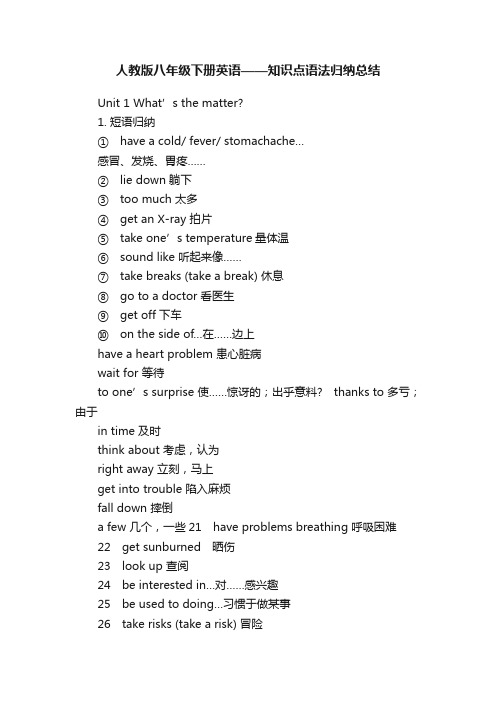
人教版八年级下册英语——知识点语法归纳总结Unit 1 What’s the matter?1. 短语归纳①have a cold/ fever/ stomachache…感冒、发烧、胃疼……②lie down 躺下③too much 太多④get an X-ray 拍片⑤take one’s temperature量体温⑥sound like 听起来像……⑦take breaks (take a break) 休息⑧go to a doctor 看医生⑨get off 下车⑩on the side of…在……边上have a heart problem 患心脏病wait for 等待to one’s surprise 使……惊讶的;出乎意料? thanks to 多亏;由于in time 及时think about 考虑,认为right away 立刻,马上get into trouble 陷入麻烦fall down 摔倒a few 几个,一些21 have problems breathing 呼吸困难22 get sunburned 晒伤23 look up 查阅24 be interested in…对……感兴趣25 be used to doing…习惯于做某事26 take risks (take a risk) 冒险27 lose one’s life 丧生28 became of 因为29 run out (of) 用尽,耗尽30 be ready to do sth. 准备做某事31 cut off 切除32 climb down 爬下33 get out of 离开;从……出来34 tell of 讲述35 the importance of (doing sth.) (做某事的)重要性36 be in control of 掌管,管理37 make a decision 做决定38 keep on doing sth. 坚持做某事39 give up 放弃40 cut/ hurt oneself 使自己受伤2. 典句必背①What’s the matter?②I have a stomachache.③What should I do?④Should I take my temperature?⑤I think you should lie down and rest.⑥If your head and neck still hurt tomorrow, then go to a doctor.⑦His love for mountain climbing is so great that he kept on climbing mountains even after this experience.3. 用法集萃(1) 当别人心情不好,身体不适或遇到麻烦时,我们可以用如下表达表示关心:What’s the matter?What’s the matter with you?What’s wrong with …?What’s the trouble\problem with …?(2) 英语中常用have描述身体的不适,此时have意为“患有”,常用结构:①have a + 疾病例:have a cold 感冒;have a fever 发烧;have a cough 咳嗽②have a + 身体部位-ache例:have a headache 头痛;have a toothache 牙痛③have a sore + 身体部位例:have a sore throat 咽喉痛;have a sore back 背痛(3) lie down躺下;tell lies/a lie 说谎含义过去式过去分词躺;平躺lay lain位于撒谎;说谎lied lied(4) maybe & may be①maybe,“或许”,常用于句首,表示可能性,后加句子。
英语人教版八年级下册语法讲解

一. 构成Have / has + 过去分词动词的过去式的变化和过去分词的变化并不完全相同。
我们对它们作了一个大致的分类。
(注:例子中单词的变化顺序为:动词原形→动词的过去式→动词的过去分词)过去式和过去分词的变化相同规则变化:1. 一般在动词词尾直接加ed。
如:pick →picked →picked; wish →wished →wished; stay →stayed →stayed2. 以不发音的e结尾的动词后面加d。
如:like →liked →liked; hope →hoped →hoped; phone →phoned →phoned3. 以“辅音字母+ y”结尾的动词,变y为i,再加-ed。
如:study →studied →studied; hurry →hurried →hurried; reply →replied →replied4. 词尾只有一个辅音字母的重读闭音节动词,要双写辅音字母,再加-ed。
如:stop →stopped →stopped; clap →clapped →clapped不规则变化:5. 以不变应万变。
如:let →let →let; put →put →put; read →read →read6. 若中间有双写e,则去掉一个e,单词末尾再加t。
如:feel →felt →felt; keep →kept →kept; sleep →slept →slept7. 结尾的字母d变t。
如:lend →lent →lent; build →built →built; send →sent →sent8. 变为以-ought或-aught结尾。
如:buy →bought →bought; bring →brought →brought; catch →caught →caught; teach →taught →taught二.意义1)现在完成时态表示:过去发生的动作对现在造成的影响或结果。
(完整版)Unit1人教版八年级英语下册语法与知识点,推荐文档

Unit 1第一部分:Grammar一、情态动词(Modal Verbs)情态动词should 意为“应该,应当”,必须和后面的动词原形一起构成谓语,没有人称和数的变化。
用以表达职责和义务、提出劝告,而且表述的是自己的主观看法。
注意:should 在以why,who,how 等疑问词开头的问句中,意为“竟然,居然,怎么会”,表示意外、惊喜或在说话人看来是不可思议的。
三、反身代词表示反射或强调的代词叫做反身代词。
反身代词是由第一人称、第二人称形容词性物主代词或第三人称代词的宾格形式,词尾加self 或selves 组成。
反身代词可译“本人”、“本身”,为加强语气,也常翻译为“亲自”、“自己”。
不定人称代词one ---- o neself.第二部分:单词用法Section A1.What’s the matter?怎么了?该句常用询问某人患了何种疾病或遇到了什么麻烦,其后用with 引出对象。
1). What’s the matter with sb.?=what’s wrong with sb.?=what’s the trouble/problem with sb.?=what’s one’s trouble/problem?e.g. What’s the matter w ith Tom?=what’s with Tom?=What’s the with Tom?=What’s Tom’s?2). matter, 名词,“问题,事情”e.g. We have important (matter) to discuss.我们有些重要的问题要讨论。
3). 动词,“要紧,关系重大”e.g. It dosen’t that you came late.2.I have a cold. 我感冒了。
1).have/get/catch a cold “感冒,着凉”The old man a cold yesterday.那位老人昨天感冒了。
人教版初中英语八年级下册全册各单元知识点、语法归纳整理
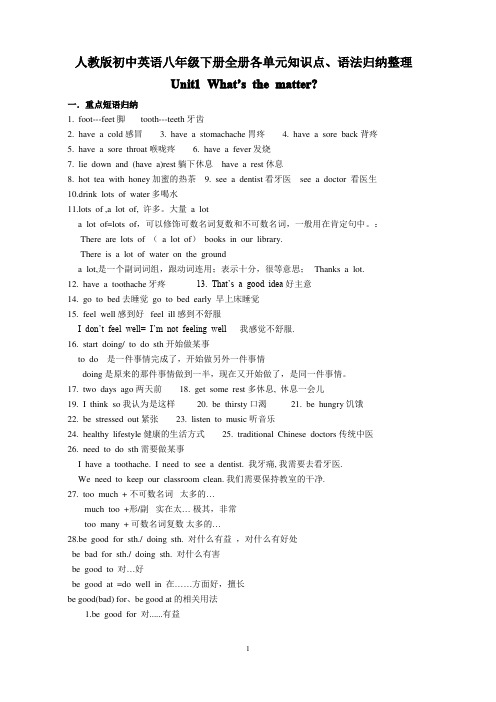
人教版初中英语八年级下册全册各单元知识点、语法归纳整理Unit1W hat’s the matter?一.重点短语归纳1.foot---feet脚tooth---teeth牙齿2.have a cold感冒3.have a stomachache胃疼4.have a sore back背疼5.have a sore throat喉咙疼6.have a fever发烧7.lie down and(have a)rest躺下休息have a rest休息8.hot tea with honey加蜜的热茶9.see a dentist看牙医see a doctor看医生10.drink lots of water多喝水11.lots of ,a lot of,许多。
大量a lota lot of=lots of,可以修饰可数名词复数和不可数名词,一般用在肯定句中。
:There are lots of(a lot of)books in our library.There is a lot of water on the grounda lot,是一个副词词组,跟动词连用;表示十分,很等意思;Thanks a lot.12.have a toothache牙疼13.That’s a good idea好主意14.go to bed去睡觉go to bed early早上床睡觉15.feel well感到好 feel ill感到不舒服I don’t feel well=I’m not feeling well我感觉不舒服.16.start doing/to do sth开始做某事to do是一件事情完成了,开始做另外一件事情doing是原来的那件事情做到一半,现在又开始做了,是同一件事情。
17.two days ago两天前18.get some rest多休息,休息一会儿19.I think so我认为是这样20.be thirsty口渴21.be hungry饥饿22.be stressed out紧张23.listen to music听音乐24.healthy lifestyle健康的生活方式25.traditional Chinese doctors传统中医26.need to do sth需要做某事I have a toothache.I need to see a dentist.我牙痛,我需要去看牙医.We need to keep our classroom clean.我们需要保持教室的干净.27.too much+不可数名词太多的…much too+形/副实在太…极其,非常too many+可数名词复数太多的…28.be good for sth./doing sth.对什么有益,对什么有好处be bad for sth./doing sth.对什么有害be good to对…好be good at=do well in在……方面好,擅长be good(bad) for、be good at的相关用法1.be good for对......有益Doing morning exercises is good for your health.做早操对你们的建康有益。
人教版八年级下册英语Unit 3单元语法知识点总结

人教版八年级下册英语Unit 3单元语法知识点总结本单元重点短语的具体用法1. do the dishes:洗餐具- I need to do the dishes before going out.(我出门前需要洗餐具。
)2. take out the rubbish:倒垃圾- Can you take out the rubbish, please?(你能倒一下垃圾吗?)3. fold your clothes:叠衣服- Remember to fold your clothes neatly.(记得把你的衣服叠整齐。
)4. sweep the floor:扫地- She sweeps the floor every day.(她每天都扫地。
)5. make your bed:整理床铺- It's your turn to make your bed.(轮到你整理床铺了。
)6. clean the living room:打扫客厅- We need to clean the living room before guests arrive.(在客人到来之前,我们需要打扫客厅。
)7. go out for dinner:出去吃饭- Let's go out for dinner tonight.(我们今晚出去吃饭吧。
)8. go to the movies:去看电影- They like to go to the movies on weekends.(他们喜欢在周末去看电影。
)9. stay out late:在外面待到很晚- Don't stay out late, it's not safe.(别在外面待太晚,不安全。
)10. get a ride:搭车- I'll get a ride with my friend.(我会和我朋友一起搭车。
)11. work on doing sth:从事做某事- He is working on writing a novel.(他正在写一本小说。
人教版八年级下册各单元英语语法解析知识重点总结
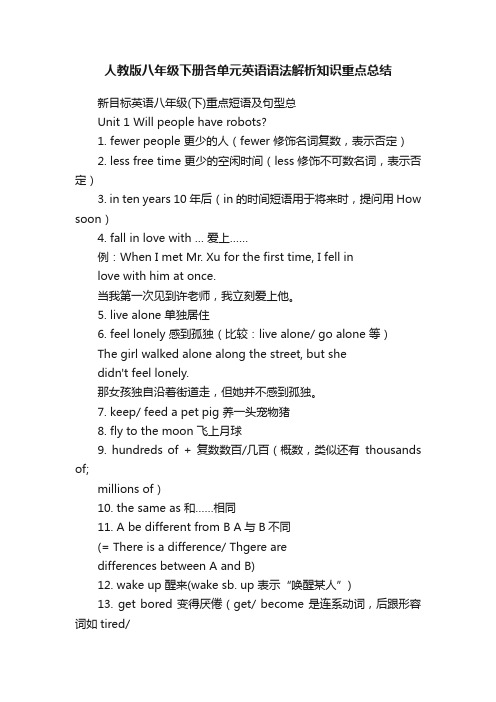
人教版八年级下册各单元英语语法解析知识重点总结新目标英语八年级(下)重点短语及句型总Unit 1 Will people have robots?1. fewer people 更少的人(fewer 修饰名词复数,表示否定)2. less free time 更少的空闲时间(less 修饰不可数名词,表示否定)3. in ten years 10年后(in 的时间短语用于将来时,提问用How soon)4. fall in love with … 爱上……例:When I met Mr. Xu for the first time, I fell inlove with him at once.当我第一次见到许老师,我立刻爱上他。
5. live alone 单独居住6. feel lonely 感到孤独(比较:live alone/ go alone 等)The girl walked alone along the street, but shedidn't feel lonely.那女孩独自沿着街道走,但她并不感到孤独。
7. keep/ feed a pet pig 养一头宠物猪8. fly to the moon 飞上月球9. hundreds of + 复数数百/几百(概数,类似还有thousands of;millions of)10. the same as 和……相同11. A be different from B A与B不同(= There is a difference/ Thgere aredifferences between A and B)12. wake up 醒来(wake sb. up 表示“唤醒某人”)13. get bored 变得厌倦(get/ become 是连系动词,后跟形容词如tired/angry/ excited 等)14. go skating 去滑冰(类似还有go hiking/ fishing /skating/ bike riding 等)15. lots of/ a lot of 许多(修饰可数名词、不可数名词都可以)16. at the weekends 在周末17. study at home on computers 在家通过电脑学习18. agree with sb. 同意某人(的意见)19. I don't agree. = I disagree. 我不同意。
人教版初中英语八年级下册语法知识点
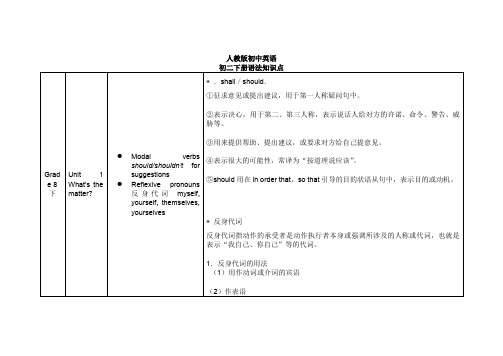
4.动词+副词+介词(其后需加宾语)
5.动词+名词(其后不加宾语)
make a bed整理床铺take place发生make faces做鬼脸
6.动词+名词+介词(其后需加宾语)
It is very kind of you to help me.=You are very kind to help me.你帮我的忙,太谢谢你了。
5.疑问词和不定式连用和疑问词连用的不定式在句中相当于名词,常作主语、宾语、表语、同位语等。
6.省略to的不定式
(1)当两个(或两个以上的)不定式由and,or,than等连接时,通常只需在第一个不定式前用to,其余不定式前的to可省略。
4)当某些结构后的不定式动作与句中某一动作重复时,不定式符号to之后的其他成分可以省略,只保留不定式符号to。常见结构有:be able to,be going to,have to,ought to,used to等。
8.不定式的主动表示被动
①在“be+性质形容词+不定式”结构中。
此类形容词有easy,hard,difficult,interesting,heavy,pleasant,comfortable,safe,dangerous,impossible等。
4.不定式的复合结构不定式用for和of引出逻辑主语,带有逻辑主语的不定式称为不定式的复合结构。不定式的复合结构在句中可作主语、宾语、定语等。
当作表语的形容词表示人的性格、品质时,常用of引出不定式的逻辑主语,否则用for引出。常见的表示性格、品质的形容词有:
good好的kind和蔼的brave勇敢的honest诚实的lazy懒惰的nice好的wise明智的clever聪明的silly傻的stupid笨的foolish愚蠢的right正确的wrong错的rude粗鲁的polite礼貌的fair公正的unfair不公正的careless粗心的careful细心的patient耐心的
- 1、下载文档前请自行甄别文档内容的完整性,平台不提供额外的编辑、内容补充、找答案等附加服务。
- 2、"仅部分预览"的文档,不可在线预览部分如存在完整性等问题,可反馈申请退款(可完整预览的文档不适用该条件!)。
- 3、如文档侵犯您的权益,请联系客服反馈,我们会尽快为您处理(人工客服工作时间:9:00-18:30)。
八年级下学期英语语法讲解(UNIT1)现在完成时的重点和难点一、现在完成时的“完成用法”和“未完成用法”1.现在完成时的"完成用法"现在完成时的"完成用法"指的是动作发生在过去某一时刻并已结束,但该动作对现在产生了影响,与现在情况具有因果关系。
例如:He has turned off the light.他已把灯关了。
(动作结束于过去,但说明的是现在的情况--灯现在不亮了。
)现在完成时"完成用法"的特点是动作不延续,因此,该时态只能与表示不定的过去时间状语(如:already,yet,before,recently等)、频度时间状语(如:never,ever,once等)、包括现在时刻在内的时间状语(如:this morning / month /year...,today 等)连用。
例如: Have you found your pen yet?你已找到你的钢笔了吗?2.现在完成时的"未完成用法"现在完成时的"未完成用法"指的是动作开始于过去某一时刻,一直延续到现在,或可能还要继续下去。
例如:He has lived here since 1978.自从1978年以来,他一直住在这儿。
(动作起始于1978年,一直住到现在,可能还要继续住下去。
)I have been in the army for more than 5 years.我在部队已经呆了五年多了。
(动作开始于5年前,一直延续至今,有可能还要继续下去。
)此种用法的句中常需一个表示一段时间的状语(由since或for引导),或表示与现在时刻相连的时间状语(如:up to now,so far到目前为止)等。
例如:I have heard nothing from him up to now.到目前为止我没有他的任何消息。
注意:(1)现在完成时的未完成用法只适用于延续性动词,不可用于终止性动词,即瞬间完成或延续时间很短的动词。
如:come,go,arrive,leave,join,become,die 等。
(2)现在完成时常见两种句型:①主语+have / has been+for短语②It is+一段时间+ since从句例如:He has been in the League for three years.或It is three years since he joined the League. 他入团已三年了。
3、延续性动词和终止性动词的概念英语中,动词按其动作发生的方式、动作发生过程的长短,可分为延续性动词和终止性动词。
延续性动词表示能够延续的动作,这种动作可以延续下去或产生持久影响。
如:learn, work, stand, lie, know, walk, keep, have, wait, watch, sing, read, sleep, live, stay 等。
终止性动词也称非延续性动词、瞬间动词或短暂性动词,表示不能延续的动作,这种动作发生后立即结束。
如open, close, finish, begin, come, go, arrive, reach, get to, leave, move, borrow,buy等。
4、延续性动词的用法特征樱·Prayer 20:58:281.延续性动词可以用于现在完成时,其完成时态可与表示"段时间"的状语连用。
表示"段时间"的短语有:for two years, during the past three years, since last year, how long 等。
如:I have learned English since I came here.自从我来到这儿就学英语了。
2.延续性动词不能与表示短暂时间的"点时间"状语连用。
如:It raind at eight yesterday morning.(误) rain为延续性动词,而at eight表示"点时间",前后显然矛盾。
如果用延续性动词表示一瞬间的动作,可以借助come, begin, get等终止性动词来表示。
上句可改为:It began to rain at eight yesterday morning.(正)又如:-When did you get to know Jack?-Two years ago.-Then you've known each other for more than two years.-That's right.5、终止性动词的用法特征1.终止性动词可用来表示某一动作完成,因此可用于现在完成时。
如:The train has arrived.火车到了。
Have you joined the computer group? 你加入电脑小组了吗?2.终止性动词表示的动作极其短暂,不能持续。
因此,不可与表示一段时间的状语连用(只限肯定式)。
如:(1)他死了三年了。
误:He has died for three years.正:He has been dead for three years. 正:He died three years ago.正:It is three years since he died. 正:Three years has passed since he died.(2)他来这儿五天了。
误:He has come here for five days.正:He has been here for five days. 正:He came here five days ago.正:It is five days since he came here. 正:Five days has passed since he came here.(1)、(2)句中的die、come为终止性动词,不能与表示"段时间"的状语连用。
那么,应如何正确表达呢?可以采用下面的四种方法:(1)将句中终止性动词转换为相应的延续性动词,如上面两例中的第一种正确表达方式。
下面列举几例:leave→be away, borrow→keep, buy→have, begin/start→be on, die→be dead, move to→live in, finish→be over, join→be in/be a member of, opensth.→keep sth. open, fall ill→be ill, get up→be up, catch a cold→have a cold。
(2)将句中表示"段时间"的状语改为表示过去确定时间的状语,如下面两例中的第二种正确表达方式。
(3)用句型"It is+段时间+since..."表达原意,如上面两例中的第三种正确表达方式。
(4)用句型"时间+has passed+since..."表达原意,如上面两例中的第四种正确表达方式。
3.终止性动词可用于现在完成时否定式中,成为可以延续的状态,因而可与表示一段时间的状语连用。
如:He hasn't left here since 1986.I haven't heard from my father for two weeks.4.终止性动词的否定式与until/till连用,构成"not+终止性动词+until/till ..."的句型,意为"直到……才……"。
如:You can't leave here until I arrive.直到我到了,你才能离开这里。
樱·Prayer 20:58:44I will not go to bed until I finish drawing the picture tonight.今天晚上直到我画完画,我才上床睡觉。
5.终止性动词可以用于when引导的时间状语从句中,但不可以用于while引导的时间状语从句中。
when表示的时间是"点时间"(从句谓语动词用终止性动词),也可以是"段时间"(从句谓语动词用延续性动词)。
而while表示的是一个较长的时间或过程,从句谓语动词用延续性动词。
如:When we reached London, it was twelve o'clock. (reach为终止性动词)Please look after my daughter while/when we are away. (be away为延续性动词短语)6.终止性动词完成时不可与how long连用(只限于肯定式)。
如:误:How long have you come here? 正:How long have you been here?正:When did you come here?二、现在完成时与一般过去时的区别1. 一般过去时表示过去某个时间发生的事、存在的状态或经常发生的动作。
说话的侧重点只在于陈述一件过去的事情,不强调对"现在"产生的影响。
如:He visited Guilin in 1998.他1998年参观过桂林。
(只说明去桂林的时间)2. 现在完成时表示动作发生在过去,对现在造成了影响或产生了结果。
不与确定的过去时间状语连用。
如:Jill has bought a new computer.吉尔买了一台新电脑。
(着重点是现在有了一台新电脑)3. 两种时态的区分(1)一般过去时的谓语动词用过去式,而现在完成时的谓语基本构成是"助动词have/has +过去分词"。
如:The film started at 7 o’clock. He has been a teacher for many years.(2)一般过去时通常与表示过去的时间状语连用。
如:yesterday, last week, two years ago, just now, in 2002等;而现在完成时则常与just, already, ever, never等副词和these days, this week, since..., for...等表示一段时间的状语连用。
看看以下的几组句子,有什么区别?① Have you seen the film?(A) Did you see the film?(B)[说明] 你看过这部电影吗?(A)句强调的是被问者对剧情是否了解;(B)句强调的是看这部电影的动作是否发生过,并不强调是否知道其内容。
